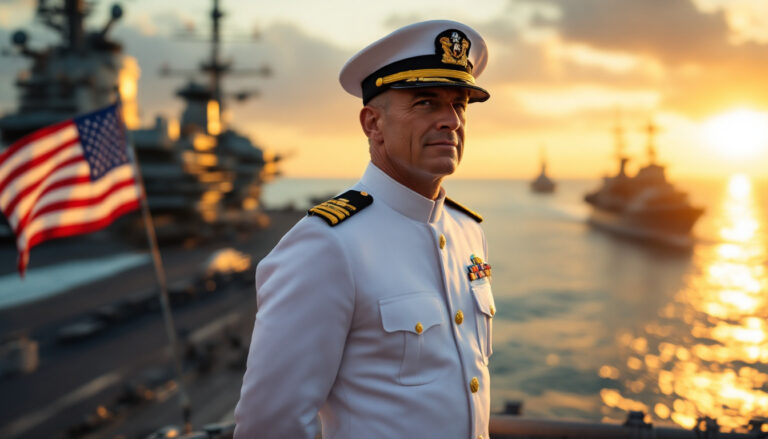The Chief of Naval Operations (CNO) serves a four-year term as the highest-ranking naval officer in the United States Navy.
The CNO position requires Senate confirmation and reports directly to the Secretary of the Navy.
While the standard term is four years, the President can extend or reduce this period based on military needs and performance.
Key Responsibilities of the CNO
- Commands all naval operations and activities
- Serves as member of Joint Chiefs of Staff
- Advises President and Secretary of Defense
- Oversees naval personnel and equipment
- Develops naval strategy and policy
Appointment Process
The selection process begins with the Secretary of Defense nominating qualified candidates to the President.
Nominees must be of four-star admiral rank with extensive naval command experience.
The Senate Armed Services Committee conducts hearings before the full Senate votes on confirmation.
Historical Context
The CNO position was established by Congress in 1915 under the Naval Appropriations Act.
Admiral William S. Benson served as the first CNO from 1915 to 1919.
Contact Information
Office of the Chief of Naval Operations
2000 Navy Pentagon
Washington, DC 20350-2000
Public Affairs Office: (703) 697-5342
Succession Planning
The Vice Chief of Naval Operations serves as the immediate successor if the CNO position becomes vacant.
A nomination for the next CNO typically occurs 6-8 months before the current term expires.
Service Impact and Legacy
Each CNO shapes naval strategy and modernization efforts during their tenure.
The four-year term allows for implementation of long-term strategic initiatives.
CNOs often continue serving as military advisors or join private sector defense consulting after retirement.
| Requirement | Detail |
|---|---|
| Minimum Rank | Four-star Admiral |
| Term Length | 4 Years |
| Reappointment | Possible with Presidential approval |
| Congressional Action | Senate confirmation required |
Operational Authority
The CNO exercises operational authority through Fleet Commanders and other naval components.
All major naval commands report through a chain of command that ultimately reaches the CNO.
Budget and Resource Management
The CNO oversees an annual budget exceeding $160 billion for naval operations and acquisitions.
Resource allocation decisions impact fleet readiness, maintenance, and modernization efforts.
Key Budget Areas
- Ship construction and maintenance
- Personnel training and retention
- Research and development
- Fleet operations and deployments
International Relations
The CNO maintains strategic partnerships with naval leaders from allied nations.
Regular international engagements help coordinate joint operations and maritime security initiatives.
Future Naval Leadership
The evolving role of the CNO reflects the Navy’s adaptation to emerging global challenges.
Strategic vision and technological innovation remain critical for maintaining naval superiority.
Each successive CNO builds upon previous accomplishments while charting new directions for the service.
The position continues to be instrumental in shaping America’s maritime presence and national security.
FAQs
- How long does the Chief of Naval Operations (CNO) serve?
The Chief of Naval Operations serves a four-year term as specified by federal law. This appointment can only be renewed in times of war or national emergency. - What is the typical career path to become a Chief of Naval Operations?
The CNO is typically a four-star admiral with extensive operational and command experience, usually having served as a fleet commander and in various high-level Navy leadership positions. - What is the primary role of a Chief Operating Officer (COO)?
A COO is responsible for overseeing daily business operations, implementing organizational strategy, and managing operational functions across the organization. - What’s the typical tenure of a Chief Operating Officer?
The average tenure of a COO varies by industry but typically ranges from 4.9 to 5.2 years, though there’s no fixed term limit as in military positions. - Can the Chief of Naval Operations be removed before their term ends?
Yes, the President of the United States can remove the CNO before the end of their four-year term, as the position serves at the pleasure of the President. - What are the key differences between military and corporate operational leadership?
Military leadership (CNO) follows a strict chain of command with fixed terms and governmental oversight, while corporate leadership (COO) operates within business structures with more flexible terms and reports to boards/CEOs. - What qualifications are required for a Chief Operating Officer?
Typically, COOs need an MBA or relevant advanced degree, 10-15 years of progressive management experience, and demonstrated success in organizational leadership and operations management. - Who does the Chief of Naval Operations report to?
The CNO reports directly to the Secretary of the Navy and serves as a member of the Joint Chiefs of Staff, reporting to the Secretary of Defense and President on military matters. - Where does a COO fit in the corporate hierarchy?
A COO typically ranks second in the corporate hierarchy, reporting directly to the CEO and overseeing other C-suite executives and department heads. - Can someone serve as both CNO and Chairman of the Joint Chiefs of Staff?
Yes, a CNO can be appointed as Chairman of the Joint Chiefs of Staff, but they must step down as CNO to assume this role.







